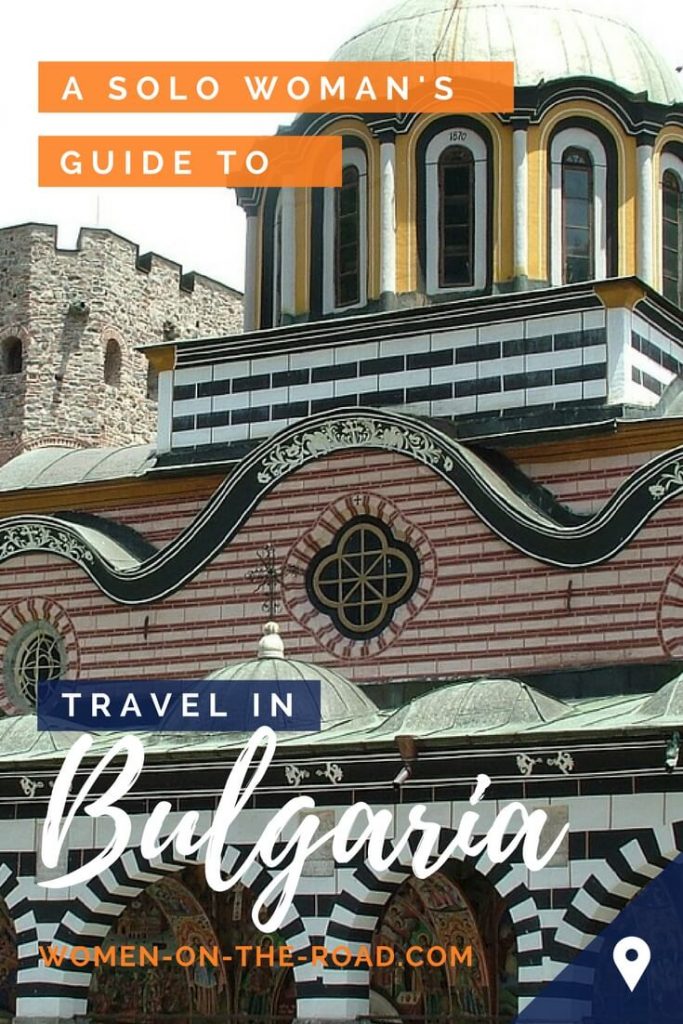Why visit Bulgaria? There are many reasons, but these three top the list: great food, heartwarming hospitality, and low-cost vacationing.
Bulgaria, located in what was once known as Eastern Europe, is still one of the few European countries where prices are affordable, infrastructure is good enough for independent travelers and it is safe to visit on your own.
This Bulgaria travel guide for solo women will show you how to experience the best of the country and answer that common question: Why go to Bulgaria?
The East European country is easily accessible. It is compact but offers a large diversity of sights and activities, making it easy to explore from border to border.
Bulgaria’s rich history has yielded ruins and temples that date back to the 4th century BCE, villages and small towns where time stopped at least 200 years ago, beautiful nature, interesting traditions, and delicious food.
The main highlights of the capital city Sofia are easy to reach on foot and transportation is reliable and cheap.
If you get tired of exploring, you can always relax at the spa, or learn about wine production and vine growing during a wine tour.
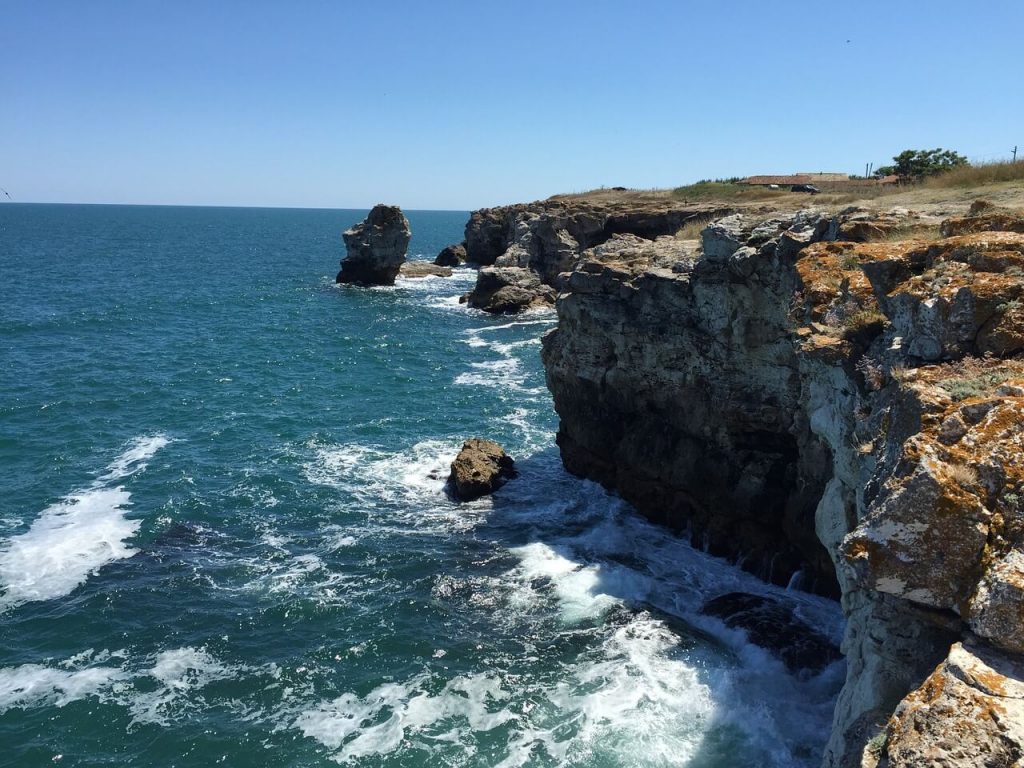
Quick Facts: Things to know about Bulgaria
| Official name | Republika Bŭlgariya |
| Capital | Sofia |
| Language | Bulgarian, Cyrillic script |
| Area | 110,994 km2 (a bit bigger than Cuba) |
| Population | 6,385,000 (2023 est.) |
| Currency | Lev (BGN) |
| Electricity | 220V/50Hz (European plug) |
What to see in Bulgaria: 10 must-see landmarks, retreats, and offbeat destinations
Bulgaria’s big cities are quite different from its small towns and villages, but both are worth seeing.
1. Solo in Sofia: So much to enjoy!
Is Sofia safe for solo female travelers? T- there’s nothing to worry about! The city is thoroughly European and as long as you take reasonable precautions against pickpocketing, you’re completely safe solo in Sofia.
Unless you’re feeling adventurous, you’ll also want to avoid getting lost. Try to get to the main building of Sofia University, founded in 1888. Right next to it, in the “St. Kliment Ohridski” underpass, you’ll find the Tourist Information Center. Grab a map and start exploring.
Why visit Sofia, Bulgaria: Landmarks you shouldn’t miss
- The Parliament building, with the bronze statue of the Tsar Liberator on horseback
- Alexander Nevsky Cathedral, with its golden domes and marble pillars
- St. Sofia Church and its underground necropolis, which dates back to the sixth century
- The archaeological excavations of the ancient Serdica city walls, also dating back to the sixth century.
2. The ancient city of Serdica
Serdica was Sofia’s name in Roman times, whose history resurfaced when the subway was built in 2010. Bulldozers clearing earth for the metro found staggering remains 2000 years old beneath the ground.
At the Serdica ruins, you’ll see examples of great religious diversity, with houses of worship of several religions. The Eastern Orthodox St. Nedelya Cathedral is at one end of the excavation site and the Banya Bashi Mosque at the other. The Sofia Synagogue and the modern building of the St. Joseph Catholic Church are a block away.
You’ll also find what is left of an amphitheater inside the Arena di Serdica hotel; the Sveti Georgi Rotunda believed to be the oldest structure in Sofia; and the Sveta Sofia church, with some 50 ancient underground tombs.
3. History in mineral waters
Nearby, you’ll also find the colorful building of the Central Mineral Bath. It now hosts the History Museum of Sofia. The collection is impressive, but the building’s interior is even more so. When was the last time you saw an exhibition of icons displayed in what used to be a therapeutic pool?
Don’t miss the opportunity to fill your bottle with hot mineral water at one of the outdoor fountains especially made for this purpose.
4. Shopping in Sofia: Pirotska Street
If you’re tired of sightseeing and want some shopping that is good value, you’ll find clothes, shoes, and souvenirs on Pirotska Street, right across from the mosque. For a stroll and a coffee break or lunch, head to the pedestrian section of Vitosha Boulevard. Just skip the shops there, as prices are inflated.
For an intriguing look at Sofia’s recent past, try this walking tour of Communist Sofia.
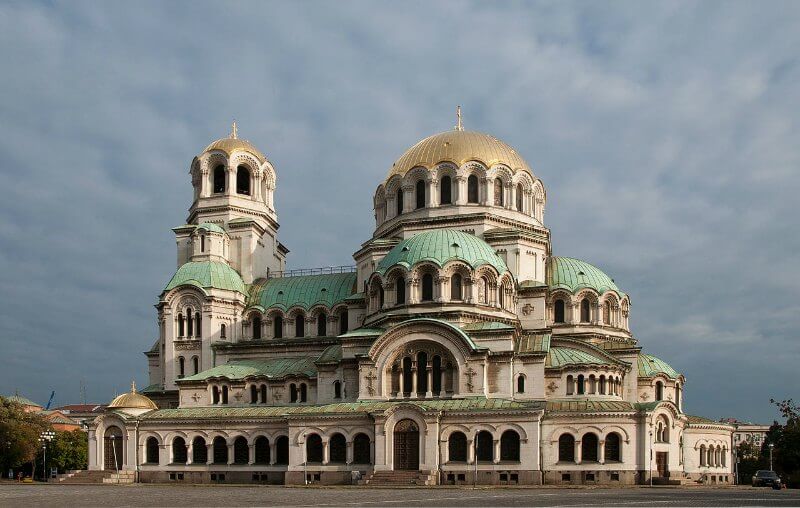
5. Plovdiv – the ancient Philippopolis theater
Enough about Sofia! While you might not want to leave after such an intense visit, there’s much more to Bulgaria than its capital.
The second largest city, Plovdiv, has one of the best-preserved ancient theaters in the world – the Plovdiv Roman Theater. Stroll along the streets of the Old Town, and visit one of the Bulgarian Revival-style houses, home to a variety of galleries and museums. You can also visit Plovdiv on a one-day tour from Sofia.
6. Tsarevets Castle and more medieval fortresses
For a totally different vibe and a flashback to another historical period, visit Veliko Tarnovo. It is Bulgaria’s old capital and is known as the “city of the Czars”. Tsarevets Castle sits on a hill above the city. Stay the night and if you’re lucky, at dusk there will be a magnificent light and sound spectacle at the fortress walls.
You may even find some medieval remnants dating back to the Bulgarian Empire, which was powerful during the Middle Ages, at times even rivaling Byzantium.
Of all the beautiful places in Bulgaria, these historic remnants are among the most striking and should not be missed on your Bulgaria trip. Other stunning venues can be found near the towns of Samokov and Borovets (often also known as Borovec, Bulgaria), a well-known ski resort.
7. Thermo-mineral spas – Relax and heal
Tired of exploring?
A great way to spoil yourself during your Bulgaria solo travel trip – go to Velingrad, the spa capital of the Balkans. The city’s many hotels offer a huge variety of wellness and beauty therapies for any budget.
Surrounded by the beautiful Rhodope Mountains, the mineral water oases will make you want to stay for a long time.
Not only are they vacation spots, but these spas are professional medical facilities often used for rehabilitation or the treatment of disease.
Other famous healing mineral springs include Hisarya, Devin, and Sandanski.

8. Adventures in Bulgarian mountains
Mountain lovers can explore easily accessible trails for every physical level. All the mountains also offer ski slopes of different difficulty levels, mountain biking trails, and rafting tours.
The Seven Rila Lakes are among the most popular destinations in the country and should not be missed if you visit the mountains.
The Rhodope Mountains offer easier trails and breathtaking views of caves, rock formations, and lovely villages, tucked between the hills. For more extreme trails, head to Pirin or Rila National Park.
This is also where you’ll find the popular skiing resort of Borovets, with its affordable resorts and beginner slopes.
Bansko Bulgaria skiing: this is a well-known resort on Pirin Mountain, with a restored Old Town and steeper and more challenging slopes for skiers with greater experience.
9. Rila Monastery – Otherworldly peace
Rila Mountain is the home of the largest East Orthodox monastery, Rila Monastery. Built in the 10th century, Rila was listed as a UNESCO World Heritage Site back in 1983.
If your itinerary allows it, try to spend a night in one of the cells. (Staying in any monastery is always an experience and probably the safest place imaginable for women traveling on their own.) If you can’t spend the night, take a day trip to Rila Monastery from Sofia.
For history and archaeology buffs there is plenty left of Ancient Bulgaria – temples, burial sites, fortress ruins, and rock formations.
The Thracian Tombs of Kazanlak, Perperikon, and Belogradchik Rocks are among them. Or if you prefer the atmosphere of an old town with colorful Bulgarian houses, head to Koprivshtitsa, Melnik, or Tryavna. Sit in one of the countless cafés and enjoy life’s slow pace, so typical of the countryside.
Visit the open-air museum Etara near Gabrovo to learn about traditions and handicrafts and buy the most authentic souvenirs you’ll find in the country.
For some atmosphere and maybe even traditional Bulgarian dances, don’t miss a visit to a typical Bulgarian restaurant while you’re somewhere in the beautiful mountain ranges.
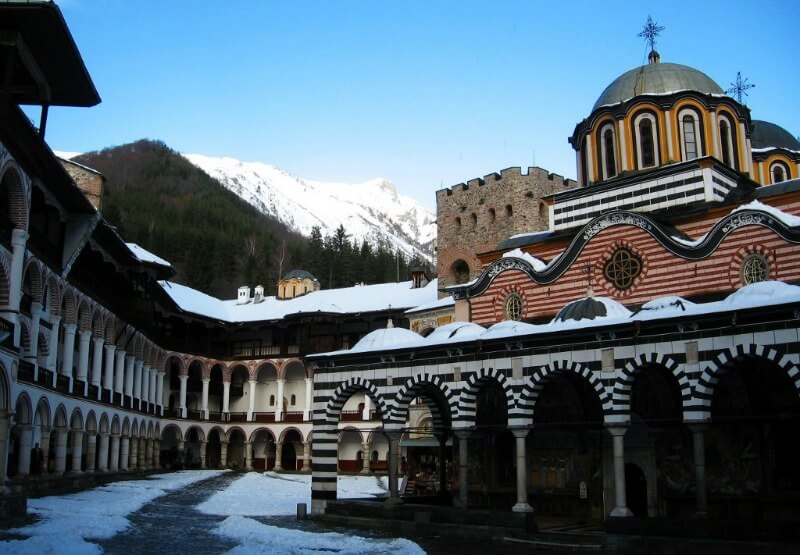
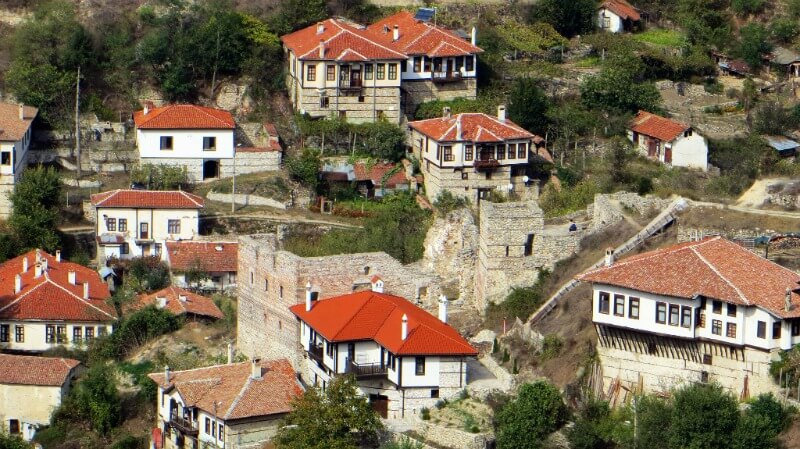
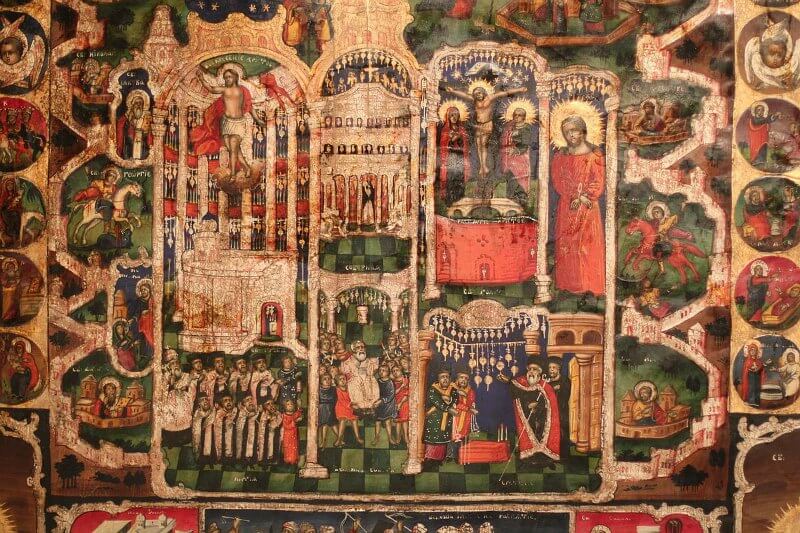
10. Black Sea Bulgaria resorts: The perfect Bulgaria vacation
If you’re visiting Bulgaria in summer, Bulgaria’s Black Sea coast has plenty, from beautiful Burgas and Varna to the resorts of Albena and Nessebar. Each town has its own white sandy beaches, with Sunny Beach one of the most popular for Bulgarian vacations.
Essential Bulgarian food and drinks
Bulgarian cuisine is an experience for all the senses. Try not to count calories, just enjoy every single meal – I’m sure all the sightseeing has made you hungry.
Start your day with a big breakfast to give you enough energy to explore. You can find little bakery shops in every neighborhood with typical pastries, such as banitsa, kifla or milinka.
For lunch, try tarator (a yoghurt soup) in summer or teleshko vareno (veal stew) in winter and a salad (shopska salad is the best if you love cheese).
For dinner, order a kebapche or three! And if you prefer to skip the meat, then kashkaval pane (breaded and pan-fried with Bulgarian yellow cheese) is the right choice for you.
Bulgarian wines are world-renowned and a great accompaniment to any meal.
If you can’t finish an entire bottle by yourself, just order a glass or two.
White wine lovers shouldn’t miss Dimiat, which is indigenous to Bulgaria, and red wine lovers should at least try Mavrud and Shiroka Melnishka loza (broadleaf Melnik vine).
Whether you’re drinking wine or not, order mineral water. Bulgaria is rich in mineral waters and beyond enjoying them in the pool, you should also bring them to the table.
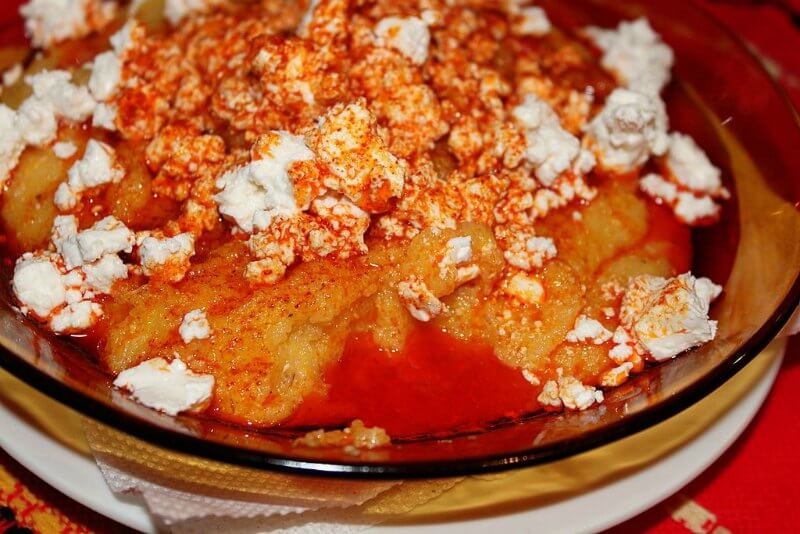
A Bulgaria guide to traditions and customs
While many things might appear the same as in the Western world, there are several local customs that might surprise you, so be prepared.
- Bulgarians shake their heads left and right for “Yes”, and nod for “No”, the opposite of Western Europeans. If unsure, ask for a verbal confirmation of the answer. A “yes” may sound like “da”!
- In many typical Bulgarian restaurants, the horo Bulgarian dances are performed after dinner and as a solo traveler, you might just be pulled in to dance along. Don’t be afraid, no one is trying to make fun of you, but rather include you in the fun.
- The Bulgarian alphabet is Cyrillic and signs are not always translated into English. More often, the names are simply transliterated into the Latin alphabet and the end result can be confusing at best, if not totally meaningless.
- In many countries, visitors are expected to cover their heads at religious temples and sites. When entering a Bulgarian church, on the other hand, you have to take off your hat or cap. Anything else you do wrong will be ignored, but this is one custom you shouldn’t forget.
Is Bulgaria safe for solo female travelers?
Bulgaria is a member of the European Union and is considered quite safe overall. However, there is much poverty so theft and scams are relatively common, making it important for you to be aware of your surroundings.
Apply the same common sense Bulgaria travel safety tips and advice you would in other countries.
- You should of course avoid dark alleys when coming back to your accommodation at night, as you would anywhere. Also, streets and sidewalks are often in poor condition, so it’s much wiser to catch a taxi.
- Beware of pickpockets, especially at tourist attractions, markets, or on public transportation, and keep your valuables in a cross-body anti-theft purse or a money belt. Always be careful when crossing streets, as drunk or reckless drivers are a huge problem.
- Avoid contact with stray dogs and other stray animals. They might seem harmless and cute to you but can get aggressive or carry diseases.
- A common and unpleasant occurrence is people going through the trash on horse-pulled carts full of garbage throughout the city. They’re harmless, although not a pretty sight. The same goes for beggars: don’t make the mistake of feeling pity and giving them money, especially if they are child beggars. They’re often organized, and it’s quite possible that they earn more money than you.
- When exchanging cash, only use a bank, not an exchange kiosk, some of which are known to scam tourists by sneaking in erroneous exchange rates. Make sure to bring your passport when you go to the bank, though – you’ll likely need it, unlike exchange kiosks. By the way, the Bulgarian currency is the lev, abbreviated to BGN.
- Paying with a card or withdrawing cash from an ATM is safe, but always check that the card slot of the machine wasn’t tampered with, and have an emergency number at hand to call and block your card if needed.
Visiting Bulgaria tips for hassle-free travel
There are four seasons in Bulgaria, so check the weather forecast and dress accordingly. If you’re headed to the mountains, be aware that temperatures drop at high altitudes in summer, but you can get sunburn in winter.
If there’s one thing you shouldn’t forget about Bulgaria, it’s to bring a travel AC adaptor. In Bulgaria, electricity is 220V / 50 Hz and the plug has the same prongs as most of Europe. But I’ve never seen adaptors being sold, so bring your own if your home country uses a different plug.
And please – don’t forget your travel insurance before you go! Two outstanding insurers are for travelers are Visitors’ Coverage and SafetyWing – whoever you choose, make sure you get insurance for any trip abroad.
Bulgaria travel resources
Accommodations in Bulgaria
- Intercontinental Sofia – a 4* hotel at the best possible location in the capital
- Starosel Hotel Winery and Spa – learn about wine, relax at the spa and visit the numerous Thracian temples nearby
- Midalidare Hotel and Spa (Mogilovo) – a spa hotel and a wine estate in the center of the country
- Aquatonik (Velingrad) – a luxury spa hotel in the spa capital of the Balkans
- Devin Spa Hotel (Devin) – a spa hotel in the heart of the Rhodope Mountains
- Rila Monastery (Rila Mountains) – even if you’re not a pilgrim, stay in a monastery from the 10th century in the heart of the highest mountain in the Balkans.
Places to eat in Sofia
- Pub Dondukov: a great place to meet people and make new friends over a few beers
- Made In Blue: a modern twist to Traditional Bulgarian and international dishes in a cozy house
- Chevermeto: traditional Bulgarian cuisine, accompanied by a show of traditional dances
Outside the capital, just follow the crowd and eat in places that are full of people, or which at least have a few occupied tables. Keep in mind that life occurs at a different pace in the countryside and that your food might take quite a long time. On the bright side, it’ll always be fresh.
Transportation during your Bulgaria visit
- Taxis in Sofia: make sure you check the sticker with the prices on the car window. Taxi scams in Sofia are very common, so if you notice anything disturbing, get out of the car as soon as possible.
- Sofia Metro: whenever possible, use the subway. It’s the fastest, safest and most reliable form of transportation. Don’t buy your tickets in advance, as their use is time limited. Instead, if you’re spending several days in Sofia, buy a magnetic rechargeable card.
- Intercity Buses: Etap is a reliable company and their routes cover most of the country.
- Bulgaria has a domestic train system and can also be reached by train from neighboring countries. You can also get a rail pass for Bulgaria.
- Traveling in Bulgaria is also possible by car if you’re keen on taking a road trip.
What is the best time to visit Bulgaria?
Like many countries with a temperate climate, Bulgaria has warm, dry summers but cooler, wetter winters. If you’re planning a beach vacation, summer − between June and August − would provide the best beach weather. Otherwise, visit in September, when the bulk of tourists have gone but the weather remains balmy and warm − warm enough to swim, even.
If you enjoy festivals, here are some of the best festivals in Bulgaria:
- In January, Pernik hosts the Festival of Masquerade Games, which gathers folkloric groups from across Bulgaria for games of “kukeri”, part of age-old pagan ceremonies designed to welcome spring. These involve intriguing and intricate costumes, which can be seen in the video below.
- In June, the country’s Rose Festival around the village of Kazanlak highlights all facets of the flower, from picking and distillation to use in cooking, alcohol or soap.
- In September, enjoy the International Puppet Festival in Plovdiv
Vacation in Bulgaria at a Glance
Top 5 best places to visit in Bulgaria
Still not sure why you should visit Bulgaria solo? Here’s what I wouldn’t want to miss out on:
- Alexander Nevski Cathedral, Sofia
- The city walls of the ancient city of Serdica, Sofia
- Countless Thracian tombs are scattered throughout the country
- Rila Monastery in the Rila Mountains
- The Ancient Roman Theatre and Plovdiv’s Old Town
Top 3 off-the-beaten-track beautiful places in Bulgaria
- St. Sophia Church and the necropolis under it, Sofia
- The spa capital of the Balkans, Velingrad
- If you travel to Bulgaria in summer, The high-rising cliffs of the rugged Northern Black Sea coast, dotted with ancient dwellings
Women need to be aware that…
While Bulgaria as a holiday destination is a safe Eastern European country, you should take certain precautions: change money only at the bank, don’t walk down dark alleys, and beware of stray animals.
You can’t leave Bulgaria without buying…
Rose oil cosmetic products: Bulgaria is the leading producer of rose oil in the world.
You can’t leave without trying these 3 foods
- Shopska Salata (the signature salad of Bulgaria in the colors of the national flag – white, green, and red)
- Tarator (cold yogurt-based soup)
- Banitsa (white brine cheese and egg-filled pastry)
For even more information
Try these excellent sites: Svet’s Bulgaria travel tips and the Magic of Traveling, by Bulgarian couple Bistra and Nace.
This post is based on an original article by Naddya Wagner of NTripping. Download your copy of her Traveller’s FREE Phrasebook of the 3 Most Necessary Words Every Respectful Traveller Must Know in 36 Languages. Connect with Naddya on Facebook, Twitter, and Pinterest.
FAQ Bulgaria Travel Guide
Is Bulgaria cheap for tourists?
Yes − Bulgaria’s tourism is affordable. If you find a few good deals, you might spend as little as €35 per night and €30 a day (on meals and tickets) as a solo traveler and still enjoy plenty of fun things to do in Bulgaria. Long Bulgarian vacations can even turn out cheaper than short visits to many European cities.
Is Bulgaria safe for women?
Most places to visit Bulgaria, especially the large cities and World Heritage sites, are very safe. As long as you take common-sense precautions (and keep your valuables safe), you’ll find few issues as a solo female traveler in Bulgaria.
Is Bulgaria safe to travel alone?
Yes. Solo travelers will feel safe and comfortable on any well-planned Bulgaria trip. The country still deals with poverty, so keep an eye on your belongings, especially on public transport.
Is Sofia safe for solo travelers?
Sofia is the capital and one of the best cities in Bulgaria to visit, especially if you’re unsure about traveling the rest of the country. There are a few areas to avoid walking at night in Sofia: around the Central Bus Station and the Sugar factory (Zaharna Fabrika) neighborhood.
Is Bulgaria worth visiting?
If centuries-old buildings, vibrant colors and flavors, lively and welcoming people, affordable accommodation, and a variety of cheap things to try and buy sound enticing − then yes, visiting Bulgaria will be a great experience worth every penny.
What is beautiful about Bulgaria?
Along with its friendly locals, lovely landscapes, 10 incredible World Heritage sites and the many historic Bulgaria places to visit, the country has more extraordinary sights than is possible to list here.
What is the best time to travel to Bulgaria?
Bulgaria has many seasonal festivals so these should be explored. As far as the weather is concerned, you’ll probably feel most comfortable in late spring (May and June) or early fall (September).
Pin these pictures and save for later!

